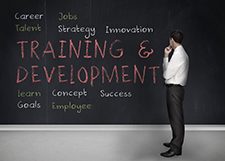 In 2016, the average working American will spend eight hours a day at work for 249 days. With a good portion of your day spent at work, why would you continue to stay in a miserable environment?
In 2016, the average working American will spend eight hours a day at work for 249 days. With a good portion of your day spent at work, why would you continue to stay in a miserable environment?
Lea McLoud coaches people in their jobs when the going gets tough. The more she works with clients, the more convinced she is that challenges we face in the workplace are of our own making.
Liza, a client of McLoud’s, was miserable in her job because her boss often publically called out her mistakes. But she was terrified to confront her manager about the situation.
Or Teresa, another client, who found herself in a tough position after feeling overwhelmed in her new job. She assumed she’d made a big mistake by accepting the position.
“Each one of them was in severe pain—pain so bad they were ready to walk away from what were frankly great jobs! The pain of those situations kept them frozen in one of the biggest workplace adversaries: fear,” McLoud said.
So how do you confront that fear and overcome your job nightmare? Start with following this easy three-step plan.
Step 1: Analyze
It doesn’t do any good to stuff your fears in the back of the closet until you are ready to confront them head on. They will just continue to be a weight on your shoulders and cause anxiety throughout the day.
To start conquering that fear, grab a journal and complete these sentences:
- I’m afraid of: (ex. Losing my job, not having any income)
- This fear is caused by: (the need to provide for my family)
- As a result of not dealing with this fear, I am: (miserable and anxious)
- If I take constructive steps to address this fear: (I will not dread going to work)
Step 2: Make a Plan
McLoud recommends exposure therapy to rewire your brain around your fear and move past it. In Liz’s case, she should take small steps to tackle the larger issue and start by asking her manager for a weekly meeting. Then, she determined that the meeting should include a recap of her accomplishments and any guidance Liz may need from her manager.
Finally, there should be a designated time to exchange feedback in the meeting where she could work towards addressing the issue of being called out in public.
“By using concepts from exposure therapy, you can drop the ultimatum-making (‘I’ve got to quit that job’) and instead, design your own exposure therapy regimen to confront your fear and take action,” McLoud said.
Step 3: Execute
Once Liz acted on her plan, she was able to resolve the issue, which was a much better plan than running away.
What job nightmare is keeping you up at night, and how do you plan to overcome it? Let us know in the comments below!
Movin’ On Up is brought to you by Express Employment Professionals.






 Getting a job is only the first step; you need to set career goals and continually improve in your craft if you want more meaningful responsibilities, higher salaries, or that big promotion.
Getting a job is only the first step; you need to set career goals and continually improve in your craft if you want more meaningful responsibilities, higher salaries, or that big promotion.